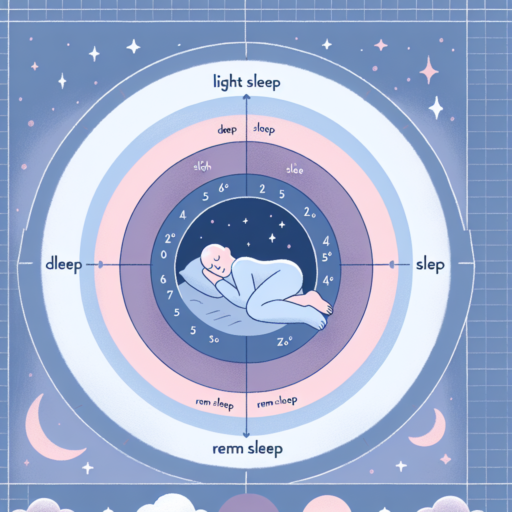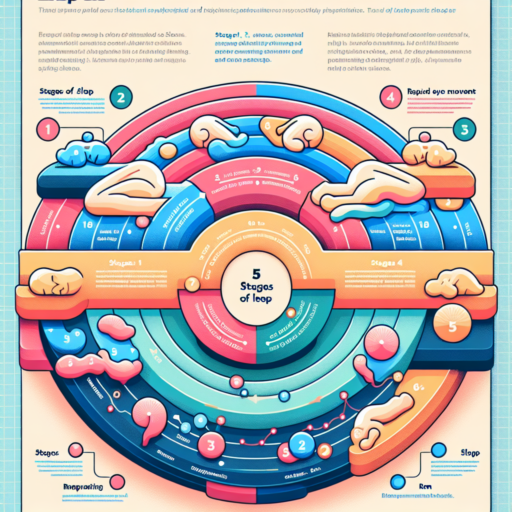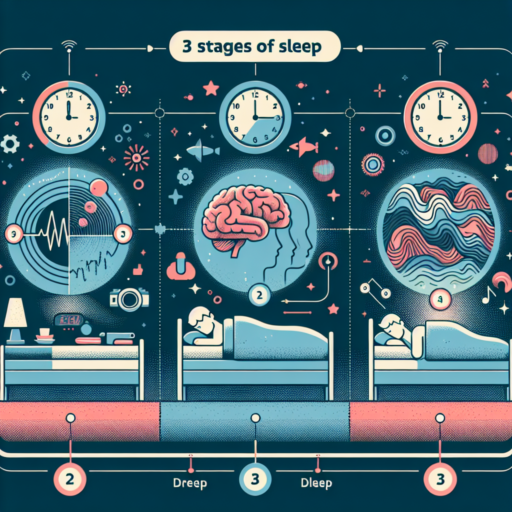Understanding Sleep: Deep vs Light Sleep
When we hit the pillow each night, our body cycles through different phases of sleep, each with its own significance. Among these, deep sleep and light sleep are critical for our physical and mental health. This distinction is not just academic; understanding the nuances between deep and light sleep can empower us to optimize our sleep for better overall well-being.
The Nuances of Deep Sleep
Deep sleep, or slow-wave sleep, is the stage of sleep where the body truly repairs and regrows tissues, builds bone and muscle, and strengthens the immune system. During this phase, brain waves slow down significantly, making it harder for us to wake up. It’s during deep sleep that our bodies focus on healing and rejuvenation, emphasizing why quality sleep can be as crucial as its quantity.
Characteristics of Light Sleep
In contrast, light sleep acts as a gateway to the deeper stages of sleep while still providing its own set of benefits, including memory consolidation and energy restoration. This stage is identified by a higher responsiveness to external stimuli, making it easier to wake up. While often overlooked in discussions about sleep quality, light sleep plays a pivotal role in transitioning the mind and body towards deeper, more restorative sleep stages.
Each phase of sleep plays a distinct yet interconnected role in our health and daily function. By unraveling the complex characteristics of deep and light sleep, we can begin to understand the sophisticated mechanism of our sleep cycles and its profound impact on our waking life.
The Importance of Deep Sleep for Your Health
Understanding the critical role of deep sleep in our wellness routine is essential for anyone looking to improve their overall health. During the deep sleep phase, our bodies go through numerous restorative processes that are key to both physical and mental health. This sleep stage helps in consolidating memories, repairing tissues, and rejuvenating the body, making it fundamental for optimal health functioning.
Physical Health Benefits of Deep Sleep
One of the most notable benefits of deep sleep is its impact on physical health. This stage of sleep is crucial for the repair and growth of tissues, bolstering the immune system, and ensuring energy conservation. As such, a lack of deep sleep can lead to a variety of health issues, ranging from weakened immunity to increased risk of chronic conditions. Regular deep sleep is, therefore, indispensable for maintaining strong physical health and preventing diseases.
Mental Health and Cognitive Performance
Equally important is deep sleep’s role in supporting mental health and cognitive performance. This restorative sleep phase is crucial for cognitive processes such as memory consolidation, emotional processing, and clearing out brain toxins, which can help in preventing neurodegenerative diseases. Individuals who ensure a sufficient amount of deep sleep tend to have better problem-solving skills, improved concentration, and a lower risk of developing mental health disorders. By prioritizing deep sleep, one can foster a healthier mind and enhanced cognitive functions.
Characteristics of Light Sleep and Its Role in Sleep Cycles
Understanding the characteristics of light sleep and its indispensable role in sleep cycles is crucial for appreciating the complexity of our sleep patterns. Light sleep, also identified in sleep studies as stage 1 and stage 2 of the Non-REM (NREM) sleep, distinguishes itself by several notable characteristics. These stages act as a gateway between wakefulness and deeper stages of sleep, serving crucial functions for mental and physical health.
Key Characteristics of Light Sleep
- The onset of sleep begins with stage 1, marking the transition from wakefulness to sleep. This stage is characterized by slow eye movements and a decrease in muscle activity.
- Stage 2, a deeper phase of light sleep, introduces sleep spindles and K complexes in brain activity, representing significant markers in sleep research for enhancing memory consolidation and cognitive functions.
- Degree of arousability: Individuals in light sleep can be easily awakened, which underscores the light nature of this sleep phase.
The role of light sleep extends beyond just serving as a precursor to deeper sleep stages. It’s a period during which the body begins to slow down, including reductions in heart rate and body temperature, setting the stage for the restorative functions of deep sleep. Moreover, transitioning smoothly through light sleep stages is essential for experiencing quality sleep cycles, impacting overall sleep quality and health.
While light sleep might not get as much attention as its deeper counterparts, understanding its characteristics reveals its crucial role in our nightly rest. Not only does it contribute to memory consolidation and cognitive functioning, but it also ensures a smoother transition into the reparative stages of sleep, highlighting the intricate balance of our sleep cycles.
How to Tell if You’re Getting Enough Deep Sleep
Understanding whether you’re getting enough deep sleep is crucial for maintaining optimal health and well-being. Deep sleep, or slow-wave sleep, is the period during which your body rejuvenates, building muscle, repairing tissue, and revitalizing your immune system. Recognizing the signs of adequate deep sleep can help you adjust your sleep habits for a better night’s rest.
One of the clearest indicators of getting sufficient deep sleep is waking up feeling refreshed and rejuvenated. If you consistently wake up feeling tired or groggy, this could be a sign that you’re not spending enough time in deep sleep. Another key sign includes having a consistent sleep schedule. If you go to bed and wake up at roughly the same times every day and fall asleep within 20 minutes of going to bed, it’s likely you’re achieving good sleep quality, including adequate deep sleep.
Monitoring your sleep with a tracker can provide insights into your sleep patterns, including how much deep sleep you’re getting. Many modern devices track sleep stages, offering detailed reports that can help you understand your sleep quality. Remember, the goal for deep sleep is to comprise about 20-25% of your total sleep. Finally, it’s important to note that the absence of frequent nighttime awakenings is a positive sign of deep sleep. If you can sleep through the night without interruptions, you’re more likely to cycle through all sleep stages adequately, benefiting from the regenerative properties of deep sleep.
Factors That Affect Deep and Light Sleep Phases
The quality of our sleep is influenced by numerous factors that can either enhance or impede our ability to cycle through deep and light sleep phases effectively. Understanding these factors is vital to ensure a restful night’s sleep, leading to improved overall health and well-being. In the realm of sleep science, particular attention is given to the aspects that specifically impact the depth and lightness of our sleep.
Diet and Nutrition
Diet and nutrition play a crucial role in regulating our sleep patterns. The consumption of caffeine and sugar, especially in the hours leading up to bedtime, can severely disrupt the transition into deep sleep phases. Conversely, certain foods rich in magnesium and potassium, such as bananas and almonds, can promote a more restful sleep by aiding muscle relaxation and nervous system regulation.
Stress and Anxiety Levels
The impact of stress and anxiety levels on sleep quality cannot be overstated. High levels of stress can lead to a hyper-aroused state, making it difficult to fall asleep or enter the deeper, more restorative stages of sleep. Techniques such as meditation, deep-breathing exercises, and limiting exposure to blue light from electronic devices in the evening can help mitigate these effects and foster a conducive sleep environment.
Physical Activity
Engaging in regular physical activity is known to have a positive impact on sleep quality. Exercise helps to regulate the body’s internal clock, promoting a healthy balance between light and deep sleep phases. However, the timing of exercise is paramount; vigorous activities close to bedtime can increase heart rate and body temperature, making it more challenging to fall asleep.
Improving Your Sleep Quality: Tips for More Deep Sleep
Ensuring a high-quality night’s sleep is imperative for both our physical and mental health. Deep sleep, also known as slow-wave sleep, plays a crucial role in our body’s recovery and rejuvenation processes. However, achieving prolonged periods of deep sleep can be a challenge for many. Here are some practical strategies designed to enhance the depth and quality of your sleep, enabling your body and mind to rest and recharge effectively.
Establish a Relaxing Pre-Sleep Routine
Creating a calming pre-sleep ritual can significantly influence your ability to fall into deep sleep more easily. Consider activities that promote relaxation such as reading a book, taking a warm bath, or practicing meditation and deep breathing exercises. These activities help signal to your body that it’s time to wind down. Avoiding screens and reducing exposure to blue light from devices like smartphones and laptops at least an hour before bed is also essential, as blue light can interfere with the natural production of melatonin, the hormone responsible for regulating sleep.
Optimize Your Sleep Environment
The environment in which you sleep plays a crucial role in promoting deep sleep. Factors such as temperature, noise, and light need to be optimized to create a conducive sleep setting. Maintaining a cool, comfortable temperature in your bedroom and reducing ambient noise can help. Consider using blackout curtains to minimize light exposure or white noise machines to drown out disruptive sounds. Investing in a comfortable, supportive mattress and pillows can also make a significant difference in your sleep quality, enabling deeper rest periods.
Maintaining a consistent sleep schedule is another vital component of achieving better deep sleep. Going to bed and waking up at the same times each day, even on weekends, helps regulate your body’s internal clock, improving your overall sleep quality. Over time, this consistency makes it easier for your body to naturally transition into deep sleep phases, enhancing the restorative benefits of your nightly rest.
Technology and Sleep: How Gadgets Influence Deep and Light Sleep
In our modern world, the intertwining of technology and daily life has become unavoidable. Particularly, its impact on sleep has emerged as a significant area of interest and concern. The way gadgets influence both deep and light sleep cycles can provide insight into larger health implications and lifestyle adjustments. Let’s delve into the multifaceted relationship between our beloved devices and our sleep patterns.
The Impact of Blue Light on Sleep Cycles
One of the most discussed aspects of technology’s influence on sleep is the emission of blue light from screens. Devices such as smartphones, tablets, and laptops emit this spectrum of light, which has been scientifically linked to disruptions in the body’s natural circadian rhythm. The exposure to blue light, especially during evening hours, can deceive the brain into believing it’s still daylight, thus reducing the production of melatonin, the hormone responsible for promoting sleep. Consequently, this interference can lead to difficulties in initiating deep sleep cycles, making the rest we do get less restorative.
Notifications and Sleep Interruptions
Moreover, the culture of always being «on» and connected can lead to frequent sleep interruptions. Notifications from emails, texts, or social media can keep the mind engaged well into the night. Even if these disruptions don’t fully awaken an individual, they can still shift the sleep from deep to light phases, reducing the overall quality of rest. This constant state of alertness not only impacts the depth of sleep but can also shorten the duration of each sleep cycle, leading to a cumulative deficit of deep sleep.
Understanding the intricate ways technology affects our sleep is paramount. While the allure of catching up on emails or scrolling through social media before bed is strong, the potential consequences on sleep quality and overall health cannot be underestimated. By being mindful of our technology use in the hours leading up to sleep, we can mitigate its impact on our rest, ensuring we achieve the deep and restorative sleep our bodies and minds require.
The Impact of Diet and Exercise on Your Sleep Phases
Understanding the relationship between your lifestyle choices and sleep is essential for improving your overall health and well-being. Diet and exercise play critical roles in influencing your sleep phases, affecting everything from the duration it takes you to fall asleep to the quality of sleep you experience throughout the night.
Adjusting your diet to include foods rich in magnesium, calcium, and vitamins such as B6 can have a positive effect on your sleep quality. These nutrients are known to support the production of melatonin, the hormone that regulates sleep cycles. Conversely, consuming high levels of caffeine and sugar close to bedtime can hinder your ability to fall asleep and progress through the natural sleep phases uninterrupted.
Similarly, exercise contributes significantly to the enhancement of sleep quality. Regular physical activity, especially aerobic exercises, have been shown to increase the amount of deep sleep you get each night. Deep sleep is crucial for physical restoration and recovery, impacting various aspects of health beyond just energy levels. However, the timing of exercise is pivotal; engaging in vigorous activities close to bedtime can energize your body and mind, making it difficult to settle down for restful sleep.
Common Misconceptions About Deep and Light Sleep
Certainly! Here’s an SEO-optimized content focusing on common misconceptions about deep and light sleep:
Misconception 1: More Deep Sleep Means Better Rest
Many believe that the key to feeling fully rested lies solely in increasing the amount of deep sleep. While deep sleep, also known as slow-wave sleep, is crucial for physical recovery and memory consolidation, it’s not the only sleep phase that matters. Our bodies require a healthy balance of both deep and light sleep cycles to function optimally. Light sleep, or Non-REM stage 2 sleep, prepares the body for deep sleep but also has its own restorative functions, including memory consolidation and muscle relaxation.
Misconception 2: Light Sleep is Not Important
Another common misconception is that light sleep is somehow less important than deep sleep. However, light sleep occupies the majority of our sleep cycle, playing a critical role in brain development, learning, and emotional well-being. Dismissing the importance of light sleep overlooks the complex nature of the sleep cycle and the essential functions each stage serves.
Misconception 3: You Can Control Your Sleep Stages
Many people believe they can control or extend certain stages of their sleep through various methods. While practices like maintaining a regular sleep schedule and avoiding caffeine before bedtime can improve sleep quality, the proportion of deep to light sleep is mostly determined by your body’s internal clock and natural needs. Trying to manipulate your sleep stages without understanding the natural balance can be counterproductive and lead to sleep disruptions.
No se han encontrado productos.
FAQs: Answering Your Questions About Deep and Light Sleep
Many of us wonder about the intricacies of our sleep cycles, especially when it comes to understanding the differences and impacts of deep and light sleep. It’s essential to unearth the science behind these stages to improve sleep quality and overall health. Here, we delve into some of the most commonly asked questions on this topic.
What Defines Deep Sleep vs. Light Sleep?
Deep sleep, or slow-wave sleep, is characterized by the slow brain waves known as delta waves. This stage is crucial for physical rejuvenation, immune system strengthening, and memory consolidation. On the flip side, light sleep serves as a transition phase between wakefulness and deeper sleep stages. It plays a significant role in cognitive processes, including learning and emotional processing. Although lighter, it’s vital for overall sleep cycles.
How Can You Tell If You’re Getting Enough Deep Sleep?
Tracking sleep through wearable technology or apps can provide insights into your sleep patterns. Key indicators of sufficient deep sleep include waking up feeling refreshed and maintaining a consistent sleep schedule. However, the amount of deep sleep one needs can vary significantly by age and individual health conditions. Adults typically require 20-25% of their sleep to be deep sleep.
Can You Increase the Amount of Deep Sleep?
Improving sleep hygiene can significantly impact the quality of deep sleep. Strategies include maintaining a regular sleep schedule, ensuring a comfortable sleep environment, and limiting exposure to screens before bedtime. Additionally, avoiding caffeine and heavy meals before sleep can aid in achieving longer periods of deep sleep. Regular physical activity is also known to enhance sleep quality, including an increase in deep sleep phases.




